
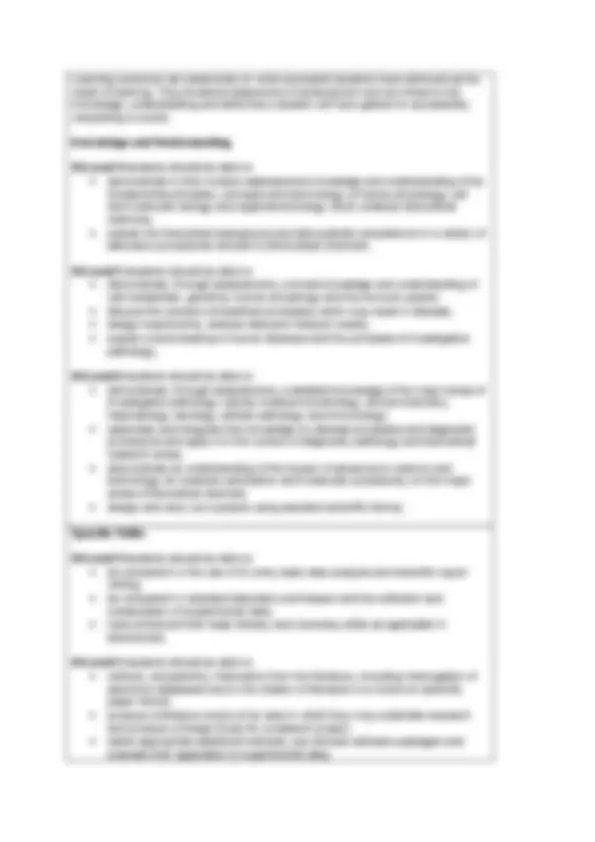

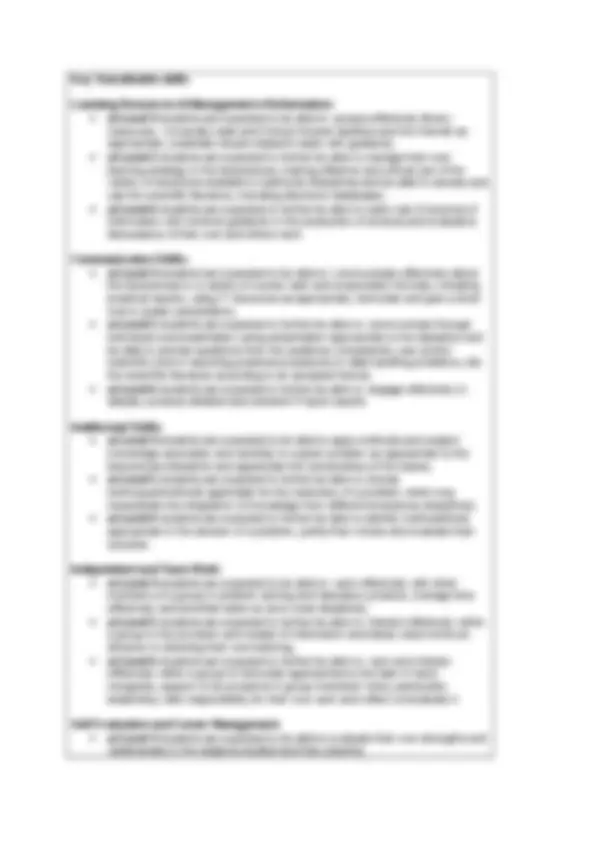
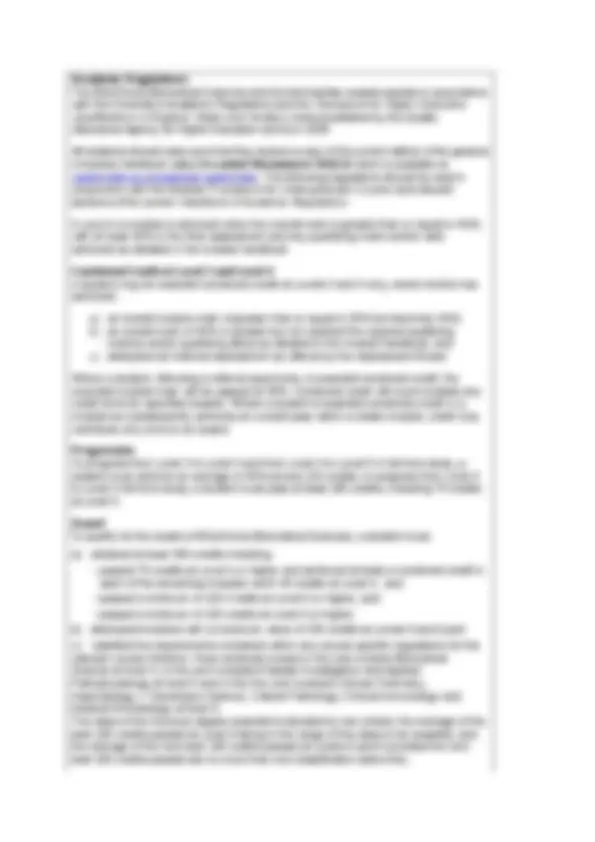
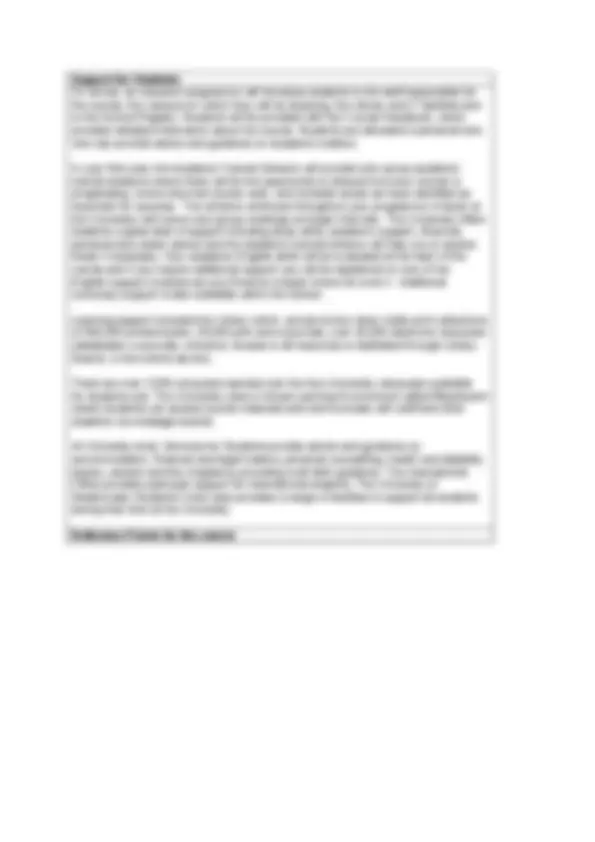
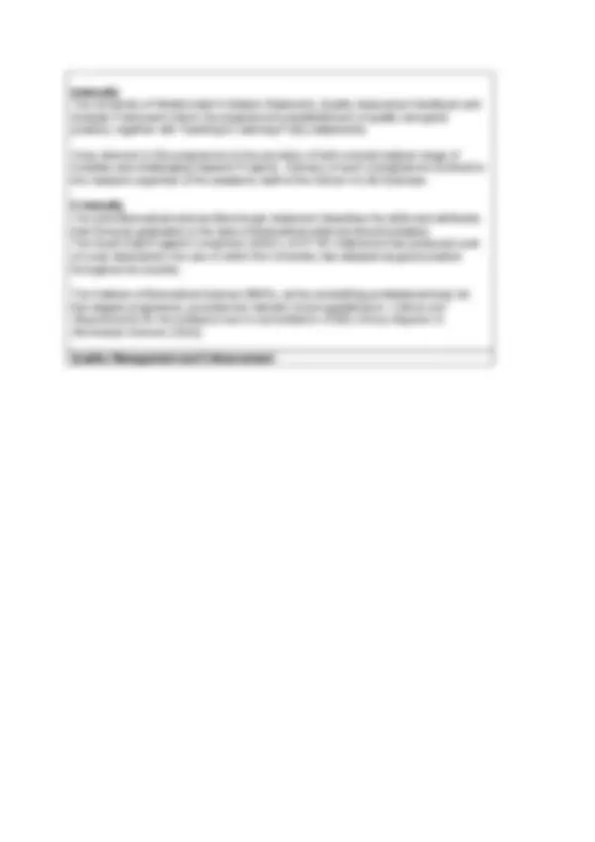


Study with the several resources on Docsity

Earn points by helping other students or get them with a premium plan


Prepare for your exams
Study with the several resources on Docsity

Earn points to download
Earn points by helping other students or get them with a premium plan
Community
Ask the community for help and clear up your study doubts
Discover the best universities in your country according to Docsity users
Free resources
Download our free guides on studying techniques, anxiety management strategies, and thesis advice from Docsity tutors
To meet the requirements of the Institute of Biomedical Science (IBMS) for membership and part fulfil the standards of education and training of the Health.
Typology: Lecture notes
1 / 12

This page cannot be seen from the preview
Don't miss anything!







Course Record Information Name and level of final & intermediate Awards BSc (Hons) Biomedical Sciences Diploma of HE Certificate of HE Awarding Body University of Westminster Location of Delivery Cavendish Campus Mode of Study Full time UW Course Code BMSSBMS / BMSFBMS JACS Code UCAS Code B QAA Subject Benchmarking Group Biomedical Science Professional Body Accreditation Institute of Biomedical Science (IBMS) Date of initial course approval/last review 2004, 2007 Date of Programme Specification 2012 Admissions Requirements Students are required to have CCC passes at A2 Level to include two Science subjects (Biology preferred) or equivalent qualifications. In addition English Language and Mathematics GCSE passes at Grade C or above are required. Students will need a good standard of English before starting your degree. If their first language and/or schooling is/was not in English, they will need a minimum IELTS score of 6.0, or a recognised equivalent. Entry into the programme at Level 5 is possible via the Assessment of Prior Certificated Learning or Assessment of Prior Experiential Learning procedures of the University for suitable entrants. Aims of the course
Key Transferable skills Learning Resources & Management of Information:
Credit Level 4 Code Title Status Value FSLS400 Biochemistry and Molecular Biology Core 30 FSLS401 Cell Biology Core 15 FSLS402 Critical Thinking for Scientists Core 15 FSLS403 Human Physiology & Anatomy Core 30 FBMS420 Biomedical Science Core 15 Elective module 15 Award of Certificate of Higher Education available Credit Level 5 Code Title Status Value FMAB500 Biochemistry Core 15 FHHS500 Applied Pathophysiology Core 15 FBMS520 Fundamentals of Disease Diagnosis Core 15 FBMS521 Immunology Core 15 FBMS522 Medical Genetics Core 15 FSLS500 Laboratory Research Methods Core 30 Elective module 15 Award of Diploma of Higher Education available Credit Level 6 Code Title Status Value FBMS600 Cellular Pathology Core 15 FBMS601 Clinical Chemistry Core 15 FBMS602 Clinical Immunology Core 15 FBMS603 Haematology & Transfusion Science Core 15 FBMS605 Medical Microbiology Core 15 FSLS603 Project Core 30 Elective module 15 Award of BSc available Award of BSc (Hons) available NB: Not all option modules will necessarily be offered in any one year.
Academic Regulations The BSc(Hons) Biomedical Sciences and its intermediate awards operate in accordance with the University's Academic Regulations and the Framework for Higher Education Qualifications in England, Wales and Northern Ireland published by the Quality Assurance Agency for Higher Education (QAA) in 2008. All students should make sure that they access a copy of the current edition of the general University handbook called Essential Westminster 2011/12 which is available at westminster.ac.uk/essential-westminster. The following regulations should be read in conjunction with the Modular Fr amework for Undergraduate Courses and relevant sections of the current Handbook of Academic Regulations. A pass in a module is achieved when the overall mark is greater than or equal to 40%; with at least 30% in the final assessment and any qualifying marks and/or sets achieved as detailed in the module handbook. Condoned Credit at Level 3 and Level 4 A student may be awarded condoned credit at Levels 3 and 4 only, where he/she has achieved: a) an overall module mark of greater than or equal to 30% but less than 40%; b) an overall mark of 40% or greater but not reached the required qualifying mark(s) and/or qualifying set(s) as detailed in the module handbook; and c) attempted all referred assessment as offered by the Assessment Board. Where a student, following a referral opportunity, is awarded condoned credit, the recorded module mark will be capped at 39%. Condoned credit will count towards any credit limits for specified awards. Where a student is awarded condoned credit in a module but subsequently achieves an overall pass within a retake module, credit may contribute only once to an award. Progression To progress from Level 3 to Level 4 and from Level 4 to Level 5 in full time study, a student must achieve an average of 40% across 120 credits; to progress from Level 5 to Level 6 full-time study, a student must pass at least 165 credits, including 75 credits at Level 5. Award To qualify for the award of BSc(Hons) Biomedical Sciences, a student must: a) obtained at least 360 credits including:
Internally The University of Westminster’s Mission Statement, Quality Assurance Handbook and Modular Framework inform the programme’s establishment of quality and good practice, together with Teaching & Learning Policy statements. A key element in this programme is the provision of both a broad subject range of modules and challenging research Projects. Delivery of such a programme is linked to the research expertise of the academic staff of the School of Life Sciences. Externally The QAA Biomedical science Benchmark statement describes the skills and attributes that Honours graduates in the area of Biomedical sciences should possess. The South East England Consortium (SEEC) of 37 HE institutions has produced a set of Level descriptors, the use of which the University has adopted as good practice throughout its courses. The Institute of Biomedical Science (IBMS), as the accrediting professional body for this degree programme, provides the relevant review guidelines in Criteria and Requirements for Accreditation and re-accreditation of BSc (Hons) Degrees in Biomedical Science (2010). Quality Management and Enhancement
Course Management Your course is managed through the Department of Biomedical Sciences within the School of Life Sciences. The Course Leader will meet you in the induction programme and can help you with module choices etc. He is responsible for development and management of the course in conjunction with the Head of Department and the Director of Undergraduate Studies for the School of Life Sciences. Course approval, monitoring and review The course was initially approved by a University Validation Panel in 2004. The Panel included internal peers from the University and external subject specialists from academia, the Institute of Biomedical Science (the professional body for Biomedical Scientists), and industry to ensure the comparability of the course to those offered in other Universities and the relevance to employers. Periodic Course Review helps to ensure that the curriculum is up-to-date and that the skills gained on the course continue to be relevant to employers. The course is monitored each year by the School to ensure it is running effectively and that issues which might affect the student experience have been appropriately addressed. Staff will consider evidence about the course, including the outcomes from each Course Committee, evidence of student progression and achievement and the reports from External Examiners, to evaluate the effectiveness of the course. The Annual Monitoring Sub-Committee considers the School action plans resulting from this process and the outcomes are reported to the Academic Council, which has overall responsibility for the maintenance of quality and standards in the University. Student involvement in Quality Assurance and Enhancement Student feedback is important to the University and student views are taken seriously. Student feedback is gathered in a variety of ways. The most formal mechanism for feedback on the course is the Course Committee. Student representatives will be elected to sit on the Committee to represent the views of their peer group in various discussions. The University and the Students’ Union work together to provide a full induction to the role of the Course Committee. All students are invited to complete a Module Feedback Questionnaire before the end of each module. The feedback from this will inform the Module Leader on the effectiveness of the module and highlight areas that could be enhanced. The University also has an annual Student Experience Survey which elicits feedback from students about their course and University experience. Students meet with Review Panels when the periodic review of the course is conducted to provide oral feedback on their experience on the course. Student feedback from Course Committees is part of the Schools’ quality assurance evidence base. For more information about this course: Admissions Tutor for the School of Biosciences; Jennifer Mackenzie; telephone 0207 911 5000 extension 65480; e-mail mackenj@wmin.ac.uk The School of Life Sciences web pages, accessible through www.westminster.ac.uk.